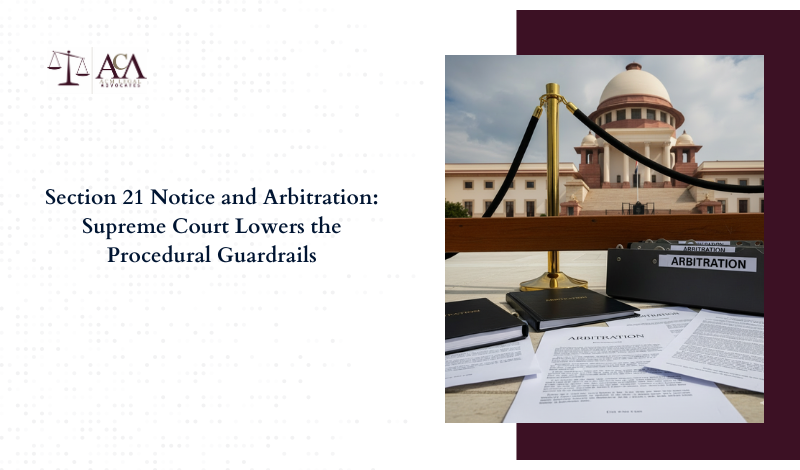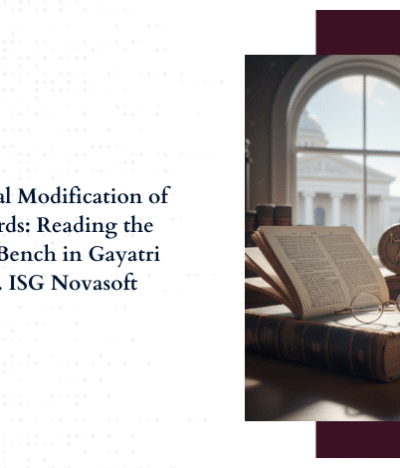Section 21 of the Arbitration and Conciliation Act, 1996 has been treated as a procedural gatekeeper. The provision requires a party to serve a notice invoking arbitration before the tribunal is said to be “seized” of the dispute. In practice, lawyers and courts often treated this notice as a rigid prerequisite, sometimes weaponising its absence to resist arbitration.
In Adavya Projects Pvt. Ltd. v. Vishal Structurals Pvt. Ltd., [1] the Supreme Court took a corrective step. It clarified that the non-service of a Section 21 notice is not a brick wall—especially when the party is otherwise bound by the arbitration agreement and the dispute squarely falls within its scope. The Court held that a party cannot escape impleadment in arbitration merely because the Section 21 notice was not formally served on them, provided their participation is necessary to resolve the dispute effectively.
This ruling recalibrates the relationship between Section 21 (notice invoking arbitration) and Section 11 (appointment of arbitrators by the court), offering both practical relief and conceptual clarity.
Facts of the Case
The dispute in Adavya Projects v. Vishal Structurals arose out of a construction project involving multiple stakeholders. Adavya Projects Pvt. Ltd. (the employer) had engaged Vishal Structurals Pvt. Ltd. (the contractor) for structural works. Disputes broke out regarding payments, delays, and responsibility for certain works.
When arbitration was invoked, a critical objection was raised: no Section 21 notice had been served on one of the parties sought to be impleaded. The argument was that without such notice, arbitration could not validly proceed against that party. The resisting party leaned on the conventional interpretation of Section 21—treating it as a threshold requirement for jurisdiction.
The matter reached the Supreme Court under Section 11 of the Arbitration Act, where the issue was:
- Can a party be joined in arbitration even if it did not receive a Section 21 notice?
- Does the absence of notice invalidate the arbitration process?
The Constitution Bench, led by Justice Sanjiv Khanna, held that procedural lapses like non-service of Section 21 notice cannot override the substantive obligation of parties bound by an arbitration agreement. Arbitration, after all, is rooted in consent and contract. If a party is undeniably part of the contractual framework and the dispute, the absence of notice cannot give them an escape route.
Section 21: Purpose and Past Practice
Section 21 of the Arbitration and Conciliation Act, 1996 provides that arbitral proceedings commence when the respondent receives a request for arbitration, unless the parties agree otherwise. The provision was meant to serve three limited functions:
- Clarity on commencement date – fixing the point from which limitation is reckoned.
- Notice to the other party – ensuring they are aware that arbitration is being invoked.
- Triggering procedural steps – paving the way for the appointment of an arbitrator or reference to an arbitral institution.
Over time, however, courts and counsel stretched this procedural safeguard into a substantive hurdle. Parties resisting arbitration would argue that the absence of a Section 21 notice meant that arbitration was never validly commenced. This technical argument became a common ground to stall proceedings, even where the existence of an arbitration clause was undisputed.
Earlier decisions such as Duro Felguera S.A. v. Gangavaram Port Ltd. (2017) 9 SCC 729 and Alupro Building Systems v. Ozone Overseas (2017 SCC OnLine Del 7228) showed a growing tendency to view Section 21 as mandatory. The practice created a paradox: arbitration—designed to be a swift, party-driven process—was being throttled by hyper-technical objections.
It is against this background that the Supreme Court’s ruling in Adavya Projects becomes important. The Court reaffirmed that Section 21 is directory, not mandatory. Its absence may affect timelines, but it cannot defeat arbitration itself when the underlying agreement and disputes are clear.
Supreme Court’s Ruling: Section 21 ≠ Jurisdictional Bar
The Supreme Court in Adavya Projects v. Vishal Structurals rejected the notion that a missing Section 21 notice strips an arbitral tribunal—or the court under Section 11—of jurisdiction. Instead, it held:
- Non-service of Section 21 notice does not nullify arbitration. Arbitration is founded on the arbitration agreement, not the procedural formality of notice. If a party has signed the contract and is bound by the clause, they cannot avoid impleadment merely by pointing to the absence of notice.
- Section 21 is procedural, not substantive. Its primary function is to mark the commencement of proceedings for limitation and procedural clarity, not to decide whether arbitration can exist.
- Courts must look at the substance. When appointing arbitrators under Section 11, the court’s role is to see if an arbitration agreement exists and whether the disputes fall within its ambit. Procedural objections like notice should not derail this inquiry.
- No escape hatch through technicality. The Court emphasised that allowing parties to escape arbitration through the loophole of notice would defeat the legislative intent of minimal judicial interference and efficiency in arbitration.
In effect, the judgment declares that Section 21 is not a jurisdictional bar but a procedural guidepost. What matters is the party’s binding obligation under the arbitration agreement, not the perfection of notice.
Interaction with Section 11: Appointment of Arbitrators
The Adavya Projects ruling also reshapes how courts should approach Section 11 petitions. Section 11 empowers the High Court or Supreme Court to appoint arbitrators when parties cannot agree. Traditionally, objections about Section 21 notice were raised at this stage to resist reference to arbitration.
The Supreme Court clarified the framework:
- Threshold test under Section 11 is narrow. The court only examines whether an arbitration agreement exists and whether the dispute is covered by it. It should not get entangled in hyper-technical objections like non-service of notice.
- Section 21 and Section 11 operate at different levels. Section 21 regulates commencement of arbitration between parties; Section 11 deals with the judicial power to constitute the tribunal. The absence of notice does not undermine the court’s authority under Section 11.
- Practical solution for impleadment. If a necessary party was not served notice but is bound by the arbitration clause, they can still be impleaded in the arbitral proceedings. This avoids fragmented disputes and conflicting awards.
- Efficiency over technicality. By separating procedural irregularities from jurisdictional inquiries, the Court ensures that arbitration is not delayed by procedural quibbles at the Section 11 stage.
Implications of the Ruling
The Adavya Projects judgment carries weighty implications for arbitration practice in India:
- End of hyper-technical objections
Parties can no longer stonewall arbitration by arguing that a Section 21 notice was not served. This shifts the focus back to substance—whether the arbitration agreement binds the parties. - Consolidation of disputes
In multi-party or multi-contract projects, impleading all relevant parties is critical to avoid inconsistent findings. The ruling enables tribunals to bring necessary parties on board, even if notice was not served, ensuring a holistic adjudication. - Reduced judicial interference
Section 11 petitions will now be insulated from notice-based objections. Courts will concentrate on verifying the arbitration agreement, leaving procedural issues to be handled within arbitration. - Clarity on limitation
While non-service of notice may create questions about the commencement date for limitation, such issues are procedural and for the tribunal to decide. They do not vitiate the arbitral process itself. - Investor and contractor confidence
By preventing procedural loopholes from derailing arbitration, the ruling bolsters India’s pro-arbitration stance and improves reliability for commercial actors, particularly in infrastructure and construction sectors where multi-party disputes are common.
Conclusion
The Supreme Court in Adavya Projects v. Vishal Structurals has delivered a pragmatic and pro-arbitration ruling. By holding that non-service of a Section 21 notice does not bar impleadment in arbitration, the Court reaffirmed that arbitration is grounded in consent and contract, not procedural formalism.
The decision harmonises Section 21 and Section 11: while notice serves as a procedural milestone, it cannot be weaponised to derail the substantive process of appointing arbitrators or impleading necessary parties. Courts will now examine the existence and scope of the arbitration agreement, leaving procedural irregularities for the tribunal to handle.
[1] SLP (C) No. 25746 OF 2024






